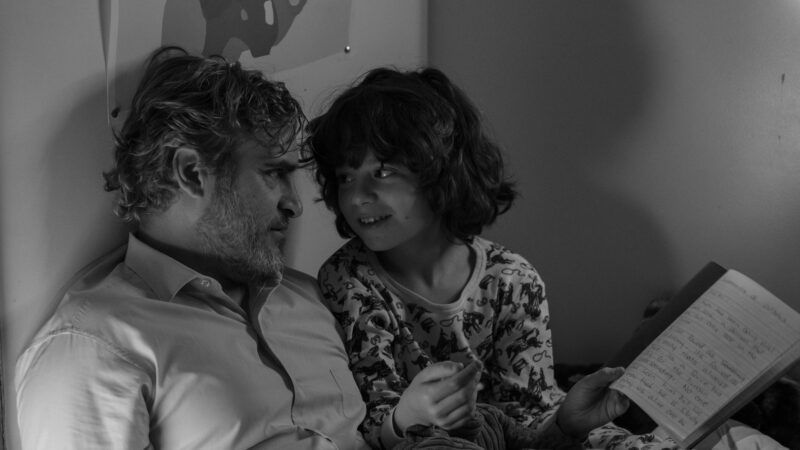Review: C'mon C'mon
Family ties.

Kids say the darnedest things. You'll be talking to one and suddenly they'll come up with something like, "Why are you alone?" or "Why aren't you married?" And you'll have to stop and think about it while they tee up another rude inquiry. Who are these little suckers?
Director Mike Mills (20th Century Women) offers some interesting answers to that question in his glowing new film C'mon C'mon. The movie begins by introducing us to a New York radio journalist named Johnny (Joaquin Phoenix). Johnny does not have a kid, but while he's visiting his sister Viv (Gaby Hoffman) and her nine-year-old son, Jesse (Woody Norman), in Santa Monica, California, Viv is suddenly called to tend to her ex-husband, Jesse's father Paul (Scoot McNairy), who's in the midst of a harrowing bipolar episode up in Oakland. She asks Johnny if he could look after Jesse in her absence, and he says sure perhaps a little too quickly.
This might sound like a setup for a noisy comedy, but it's not. The movie is really about the modern world as it's experienced by children. It's also about the architecture of families. And because of Johnny's job, it's a road-trip movie, too. Johnny's current radio project involves traveling around the country with a production crew recording interviews with kids. (It's probably already been done, but if not, some enterprising outlet should actually do a show like this, because the kids—all non-actors—and their unscripted responses are fascinating.) Johnny's questions are enticingly open-ended ("If your parents were your children, what would you want them to learn?") and some of the answers he elicits come winging in from out of the blue. ("What would you change about yourself?" he asks one little girl. "My anger," she says.)
As it moves from Detroit to New York to Los Angeles and New Orleans, the movie is visually unified by Robbie Ryan's creamy black-and-white cinematography and enriched by Phoenix's paunchy, graying, rumpled, and stubbly real-world performance. (There are no remnants of the dark characters he has created for movies like Joker and You Were Never Really Here.) It is also immeasurably enhanced by Woody Norman, a beguilingly gifted British actor who was about nine years old when the picture was shot two years ago. Equipped with the standard cute-kid attributes (big gleaming eyes, appealingly tousled hair), Norman is also capable of convincing you he's giving a plot situation some actual thought, and he locks into the emotional complexities of the story with complete commitment. With a facility beyond his years, he plays Jesse as a quick, intuitive kid who's precociously perceptive about the ways of the grown-up world. "I don't really have friends," he tells his uncle. "I hang out mostly with adults."
Johnny doesn't attempt to fill the space in Jesse's life that's been left by his absent father. He tries instead to be a pal and a confidante—a cool uncle. Jesse is receptive to this approach, and we see the two of them walking happily on a Santa Monica beach with the vast, sparkling Pacific running along beside them, and, back in New York, chattering away as they navigate the teeming sidewalks of the Chinatown neighborhood where Johnny lives. But there are sudden squalls in their round-the-clock relationship, too. "I don't even know you," Jesse snaps at one point. "Why did Mom let me come with you?"
These unexpected turnarounds feed into Johnny's own occasional resentments, so he rings his sister for counsel. She tells him that she often feels exactly the same way—she loves Jesse more than life itself, but his constant presence sometimes drives her crazy: "It just goes on and on," she says. And here we have the arhythmic heartbeat of parenthood itself. "I know as a mother you won't understand this," Johnny tells Viv ironically. "But taking care of him and working at the same time is a little too much."


Show Comments (12)